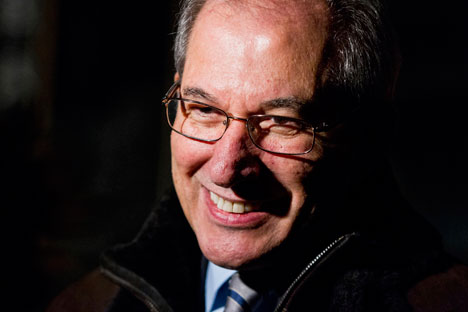
Organisation for the Prohibition of Chemical Weapons Director General Ahmet Uzumcu will receive the 2013 Nobel Peace Prize at a ceremony on December 10. Source: Reuters
Russia Beyond the Headlines: How is the process of eliminating chemical weapons in Syria going?
Ahmet Uzumcu (A.U.): Our activities there are fully on track. Our inspectors and United Nations staff took up their work in Syria in October 1, only four days after the OPCW agreed on a program of action. The capacity to produce chemical weapons was rendered inoperable within a month. Now the joint mission continues to make progress on a daily basis. The removal of the weapons for destruction outside of Syrian territory is currently our main focus, and operations are expected to begin soon.
RBTH: Which technologies are used?
A.U.: Various methods can be used for the destruction of chemical weapons. These include hydrolysis, a process of decomposing chemical compounds by reaction with hot water. They can also include incineration, which is the destruction of waste in a furnace through controlled burning at high temperatures. In the case of Syria, priority chemicals will be destroyed by hydrolysis on a U.S. vessel equipped with two hydrolysis plants. Other chemicals will be disposed of in commercial facilities, in the same way as regular industrial chemicals are treated.
RBTH: What are the difficulties on this way?
A.U.: The elimination of Syria’s chemical weapons program is a daunting task. This sort of operation has never before been carried out in an active war zone. The safety and security of our staff remains our utmost priority. The next operational stage of the joint mission is highly complex, including the transport of chemicals for destruction outside Syria. There are significant technical, financial and logistical challenges to be addressed. Careful operational planning is well under way. We are working closely with the United Nations, states parties [to the OPCW] and other partners in this regard.
RBTH: Do you think there is any chance that this process of eliminating might be stopped or face any troubles in proceeding?
A.U.: The most challenging work still lies ahead of us. We have to be alert to those factors that lie outside of our control. They can have a significant impact on the joint mission’s operations. Foremost among them is the security situation in Syria, which remains a source of concern. Another crucial factor for success is adequate international support. We are actively reaching out to the international community to elicit the necessary assistance.
RBTH: How much time it will take to eliminate all chemical weapons in Syria?
A.U.: The completion date is set for mid-next year—June 30, 2014, with intermediate milestones for removal and destruction. Chemicals defined as “most critical” or “priority” need to be transported outside of Syria by December 31 for destruction by the end of March. We are all aware that the timelines are ambitious, and we are all working hard to meet them.
RBTH: What kind of support does Russia give? How much does it help the OPCW?
A.U.: The Russian Federation, along with the United States, played a crucial role in concluding the framework agreement on Syria’s chemical weapons in Geneva. Russia continues to make an important contribution to this process.
RBTH: How significant was winning the Nobel Peace Prize for you personally as a head of OPCW? How much does it mean for your organization?
A.U.: The prize honors all of us – our states parties and secretariat staff, past and present. This award will inspire us to an even deeper resolve and to even greater efforts in our ongoing and future work. I also hope that this recognition will spur the international community on to broader, more ambitious efforts in disarmament.
RBTH: How will OPCW spend the money (926,000 euros) that you will get as a Nobel Peace Prize winner?
A.U.: The money awarded by the Nobel Committee will be used to create a fund for annual OPCW awards. These awards will recognize outstanding contributions to advancing the goals of the Chemical Weapons Council.
RBTH: Can this public award be considered as a reminder for main holders of stockpiles to eliminate their storage?
A.U.: The award of the Nobel Peace Prize in 2013 is, above all, an unequivocal endorsement of the mission of the OPCW, which is to achieve a world free of chemical weapons. The award also reinforces our continuous calls on those six states remaining outside of the convention to joint without delay or precondition.
RBTH: What financial sources are used for the eliminating chemical weapons?
A.U.: Under the convention, a possessor state of chemical weapons and their production facilities is responsible to bear the cost for their destruction. The Syrian authorities have requested the support and assistance of the international community to carry out this task.
The OPCW has established two trust funds for voluntary contributions from states parties to this end. Both the OPCW and the United Nations are conducting outreach to the international community to obtain the necessary assistance, which is crucial for the successful completion of our work. Both Russia, as I had already mentioned, and the United States have played a critical role in support of the mission to eliminate chemical weapons in Syria. This entire process, and the work of the joint mission, is taking place under the guidance of the OPCW Executive Council and the United Nations Security Council.
All rights reserved by Rossiyskaya Gazeta.
Subscribe
to our newsletter!
Get the week's best stories straight to your inbox